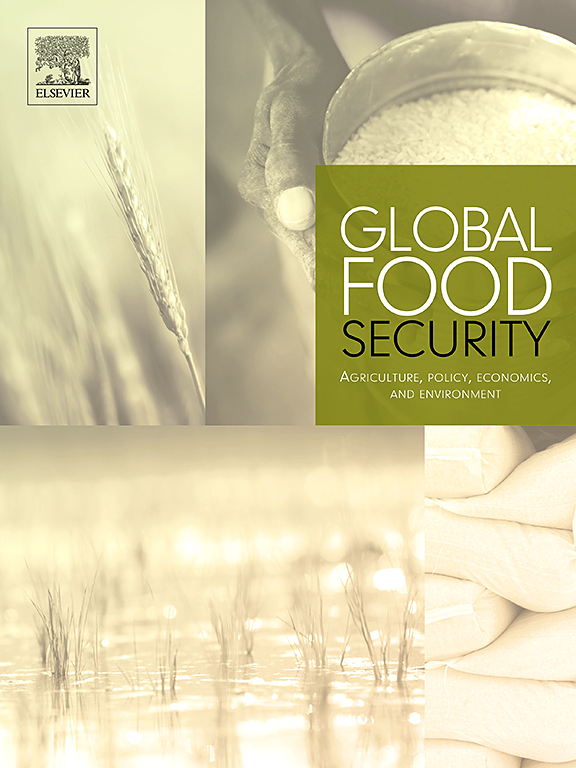Time to transform? Sustainability narratives for European food systems
IF 9.6
1区 经济学
Q1 FOOD SCIENCE & TECHNOLOGY
Global Food Security-Agriculture Policy Economics and Environment
Pub Date : 2025-02-06
DOI:10.1016/j.gfs.2025.100831
引用次数: 0
Abstract
The unsustainable nature of prevailing food systems contributes to drive humanity out of a safe operating space. Despite recognising the need for food systems transformation, its direction diverges into different sustainability narratives and conflicting objectives resulting in disjoint policy agendas and problem definitions. While few studies compared and identified gaps and trade-offs in food systems frameworks, systematic reviews for conceptualising sustainable food systems remain scarce. Focusing on the European context, we investigated how academics framed sustainability narratives and their role in advancing Sustainable Development Goals targets, exploring lock-ins and leverage points for food system transformation. By conducting a PRISMA systematic scoping review and analysing 94 documents, we found disparities in current research with socio-economic and cross-cutting aspects comparatively overlooked to environmental and health ones. Linking sustainability objectives to 55 SDG targets we demonstrated their potential contributions to sustainable development by addressing systemic conceptualisations and acknowledging trade-offs. We identified lack of vision and coordination among stakeholders and institutional framework shortcomings as barriers to change. Analysis of leverage points suggested stakeholder engagement and system transparency as pivotal for transformation. Last, we draw concrete implications for science and policy agendas to shape a food systems transformation grounded in a shared sustainability paradigm forged through collaborative efforts among scientific, policy, and societal domains.

是时候转型了?欧洲粮食系统的可持续性叙事
现行粮食系统的不可持续性导致人类被赶出安全的生存空间。尽管认识到粮食系统转型的必要性,但其方向分歧为不同的可持续性叙述和相互冲突的目标,导致政策议程和问题定义脱节。虽然很少有研究比较和确定粮食系统框架中的差距和权衡,但对可持续粮食系统概念化的系统审查仍然很少。以欧洲为重点,我们调查了学者如何构建可持续发展叙事及其在推进可持续发展目标目标中的作用,探讨了粮食系统转型的锁定和杠杆点。通过对prism系统范围审查和分析94份文件,我们发现,与环境和健康方面相比,目前研究中的社会经济和跨领域方面存在差异。我们将可持续发展目标与55个可持续发展目标联系起来,通过解决系统概念和承认权衡,展示了它们对可持续发展的潜在贡献。我们认为,利益相关者之间缺乏远见和协调,体制框架的缺陷是变革的障碍。对杠杆点的分析表明,利益相关者参与和系统透明度是转型的关键。最后,我们得出了科学和政策议程的具体含义,以塑造通过科学,政策和社会领域之间的合作努力形成的共享可持续性范式为基础的粮食系统转型。
本文章由计算机程序翻译,如有差异,请以英文原文为准。
求助全文
约1分钟内获得全文
求助全文
来源期刊

Global Food Security-Agriculture Policy Economics and Environment
FOOD SCIENCE & TECHNOLOGY-
CiteScore
20.90
自引率
3.40%
发文量
69
期刊介绍:
Global Food Security plays a vital role in addressing food security challenges from local to global levels. To secure food systems, it emphasizes multifaceted actions considering technological, biophysical, institutional, economic, social, and political factors. The goal is to foster food systems that meet nutritional needs, preserve the environment, support livelihoods, tackle climate change, and diminish inequalities. This journal serves as a platform for researchers, policymakers, and practitioners to access and engage with recent, diverse research and perspectives on achieving sustainable food security globally. It aspires to be an internationally recognized resource presenting cutting-edge insights in an accessible manner to a broad audience.
 求助内容:
求助内容: 应助结果提醒方式:
应助结果提醒方式:


